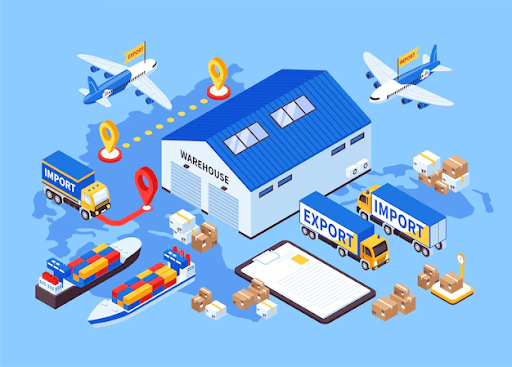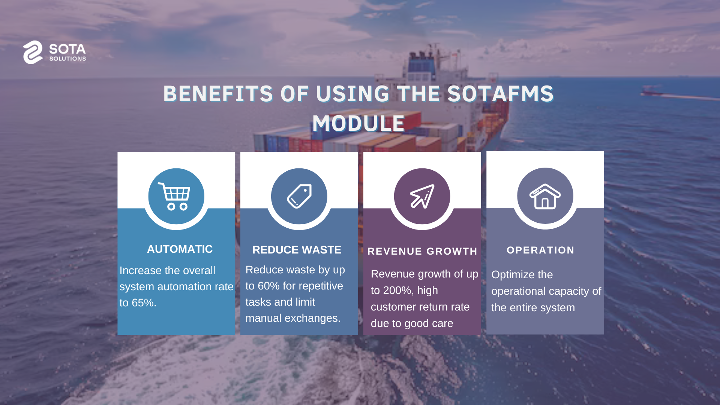The comprehensive Freight Forwarder Management Software (FMS) helps logistics and transportation businesses optimize their operations with powerful features such as financial management, CRM, order management, quotations, supplier management, and real-time reporting. FMS is an effective solution that enhances customer experience, manages costs, and improves decision-making capabilities for businesses in the logistics industry.
1. Freight Forwarder Management Software (FMS)

In the logistics field, freight forwarding companies play an important role in connecting manufacturers with carriers, ensuring that goods are delivered to the right place, at the right time, and at optimal cost. Effectively managing processes from order handling, customer management, finance, to quoting and supplier management is a complex and time-consuming task.
The Freight Forwarder Management System (FMS) software is designed to address these challenges, helping businesses automate and optimize the entire logistics process. FMS integrates many management functions such as accounting, finance, customer relationship management, order management, and real-time reporting, supplier quotations to provide convenience and enhance efficiency for logistics companies.
2. The main features of the FMS software

The FMS software provides a range of essential features that help logistics companies operate efficiently and optimize resources. Below are the standout features of a comprehensive FMS system:
Accounting and Finance
One of the indispensable features of the FMS software is accounting and financial management. FMS provides the ability to track and record financial transactions related to shipping costs, taxes, and customer payments. Businesses can easily manage cash flow, automate invoicing, and process payments on time. This feature helps ensure transparency in all transactions and improves financial control.
In addition, the system also supports detailed financial reporting, helping businesses grasp the overall financial situation, from revenue and expenses to the profit of each project or shipment.
Customer management (CRM)
The FMS software integrates a CRM (Customer Relationship Management) system, helping businesses manage all information and interactions with customers. Through CRM, logistics companies can store detailed information about customers, from transaction history to specific requests.
CRM helps businesses maintain good relationships with customers, track the progress of their orders, and provide better support services. Additionally, businesses can analyze customer behavior to develop more effective customer care and marketing strategies, creating a distinction from competitors.
Managing the supplier price list (Pricing)
An important factor in the logistics field is collaborating with transportation service providers. FMS allows businesses to manage supplier pricing tables, from tracking shipping rates to additional costs such as warehousing fees, loading and unloading, or cargo insurance.
This system helps businesses easily compare prices between suppliers and choose the most suitable shipping partner. This feature not only helps optimize costs but also improves collaborative relationships with suppliers through effective management of contracts and price lists.
Quote management
Quote management is an important part of the business operations of a freight forwarder. FMS helps create and track quick quotes for customers based on parameters such as route, transportation method, and delivery time. The system also automatically updates related factors such as fuel costs, customs fees, and fluctuations in shipping rates from suppliers.
The quotation management feature not only helps businesses respond to customer requests quickly but also ensures accuracy and competitiveness in pricing, creating a market advantage.
Booking management
The booking management feature of FMS helps businesses track and manage the entire booking process for customer shipments. Since receiving the booking request, the system will assist businesses in coordinating with transportation service providers, managing information about the shipment, and updating the booking status in real-time.
Thanks to that, businesses can closely monitor the shipments in transit, accurately update the schedule, and promptly inform customers about the shipping progress. This helps enhance transparency and ensures that goods are delivered on time.
Order management
Order management is the core feature of the FMS system. With this feature, businesses can manage everything from receiving customer requests, processing orders, to managing shipping and delivery information. FMS helps automate processes related to order management, reducing errors and saving time.
The system provides a comprehensive view of each order, helping businesses better control every stage of the delivery process. In addition, FMS also provides detailed information about the transaction history of each order, thereby helping businesses easily manage and track ongoing orders.
Instant report
The instant reporting feature is one of the most powerful tools that the FMS system offers. The system allows businesses to generate detailed reports on operational performance, order status, logistics costs, and other key metrics with just a few clicks.
Businesses can easily generate real-time reports, helping managers grasp the current operational situation instantly. Thanks to that, they can make quick and timely decisions, ensuring that every aspect of logistics operations is effectively controlled. This report also provides strategic information to help businesses optimize processes and minimize unnecessary costs.
3. Benefits of FMS software for logistics and transportation businesses

The implementation of the FMS software brings numerous outstanding benefits to transportation and logistics companies, from optimizing operational processes to improving customer experience and enhancing financial efficiency.
Automating and optimizing business processes
The FMS software helps automate many important processes such as order management, transportation cost calculation, and goods tracking. Thanks to that, businesses can minimize errors caused by manual operations, saving time and personnel costs. The system also helps businesses optimize routes and transportation methods, reduce costs, and enhance efficiency.
Enhancing shipment management and tracking capabilities
The ability to monitor the status of goods in real-time helps businesses better control the transportation process and respond quickly to unexpected changes. Businesses can forecast and adjust shipping plans if delays are detected, thereby ensuring that goods are delivered on time and minimizing risks.
Cost optimization
FMS helps businesses control and analyze logistics costs in detail, from transportation and storage costs to customs-related fees. This helps businesses easily identify unnecessary expenses and seek cost optimization solutions, thereby increasing profits and improving cash flow.
Improving customer service
Thanks to the FMS system, logistics companies can provide customers with accurate and up-to-date information about the status of their shipments. This helps enhance customer experience, build trust, and create a difference compared to competitors. Customers can track their orders through the customer portal or receive real-time delivery progress notifications.
Compliance with regulations and risk mitigation
FMS helps businesses easily comply with regulations related to the transportation of goods and customs, while also minimizing legal risks. The system automates procedures and checks the validity of documents, ensuring that all activities comply with the regulations of the relevant authorities.
4. Development trends of FMS software

The FMS software continues to develop strongly with the application of many new technology trends, helping to enhance efficiency and flexibility for logistics and transportation businesses.
FMS on the cloud platform
FMS on the cloud platform is becoming increasingly popular due to its cost-saving capabilities and high flexibility. Businesses do not need to invest in complex server infrastructure but can still access the system from anywhere through an internet connection. This helps enhance scalability, system upgrades, and easy deployment for multiple branches or global offices.
Integrating artificial intelligence (AI) and machine learning (ML)
Modern FMS systems are integrating artificial intelligence and machine learning to optimize operational processes. AI can analyze data to predict transportation demand, optimize routes, and forecast potential issues. Machine learning makes the system increasingly smarter, improves performance, and predicts market fluctuations more accurately.
Mobile FMS
With the popularity of mobile devices, modern FMS solutions are increasingly developing mobile applications, allowing managers to conveniently monitor transportation status, coordinate goods, and handle issues remotely. This brings high flexibility, especially in the context of the rapidly changing transportation market.
5. Steps to implement FMS software in the enterprise

To ensure the FMS software is successfully implemented and brings high efficiency, the enterprise needs to follow a systematic step-by-step process. Below are the common steps for implementing FMS:
5.1. Needs analysis and goal setting
Businesses need to clearly define specific requirements and objectives when implementing FMS, such as optimizing operational processes, improving financial management, or enhancing customer experience. This helps guide the implementation of software to meet actual needs.
5.2. Choosing the appropriate software and supplier
Based on criteria such as integration capability, security, support, and flexibility, the business chooses FMS software and a reputable provider. This is an important step because a suitable partner will ensure the stability of the system and provide good support for the business.
5.3. Develop a detailed implementation plan
Together with the supplier, the business develops a detailed implementation plan that includes testing phases, employee training, system installation, and integration with existing software. Clear planning will help the implementation process go smoothly and make it easy to adjust when necessary.
5.4. Training and supporting employees
Employees in the enterprise need to be thoroughly trained on how to use the FMS system, from basic operations to detailed operational procedures. Effective training will help employees quickly familiarize themselves with the software, make the most of its features, and minimize errors when using it.
5.5. Monitoring, evaluation, and improvement
After deployment, businesses need to closely monitor the performance of the FMS, gather feedback from users, and evaluate its actual effectiveness. From there, the business can adjust processes and improve systems so that FMS maximizes benefits and meets long-term needs.
6. Leading Freight Forwarder Management Software (FMS) provider
Sota Solutions is a leading reputable unit specializing in providing high-quality Freight Forwarder Management System (Sota FMS) software, which has been trusted and chosen by many logistics companies. With many years of experience in developing ERP enterprise management solutions, Sota Solutions continuously improves technology and updates the most modern features to meet the diverse needs of customers.
The team of experts at Sota Solutions is committed to accompanying businesses throughout the implementation and support process, from solution consulting, deployment to training and maintenance. Thanks to its professionalism and dedication, Sota Solutions' Sota FMS software helps transportation and logistics businesses optimize their operational processes, manage costs effectively, and enhance service quality, creating a solid foundation for sustainable development in the logistics industry.
7. Conclusion
The comprehensive Freight Forwarder Management Software (FMS) is the ideal solution for logistics companies in the increasingly competitive logistics market. FMS not only helps automate and optimize operational processes but also enhances tracking capabilities, cost management, and provides better customer service.
In the future, with the development of technologies such as artificial intelligence, machine learning, and cloud platforms, FMS continues to be a powerful tool that helps logistics businesses seize opportunities, minimize risks, and optimize logistics operations. The implementation of a comprehensive FMS system will help businesses maintain and enhance their competitive edge, better meet customer needs in the digital age.